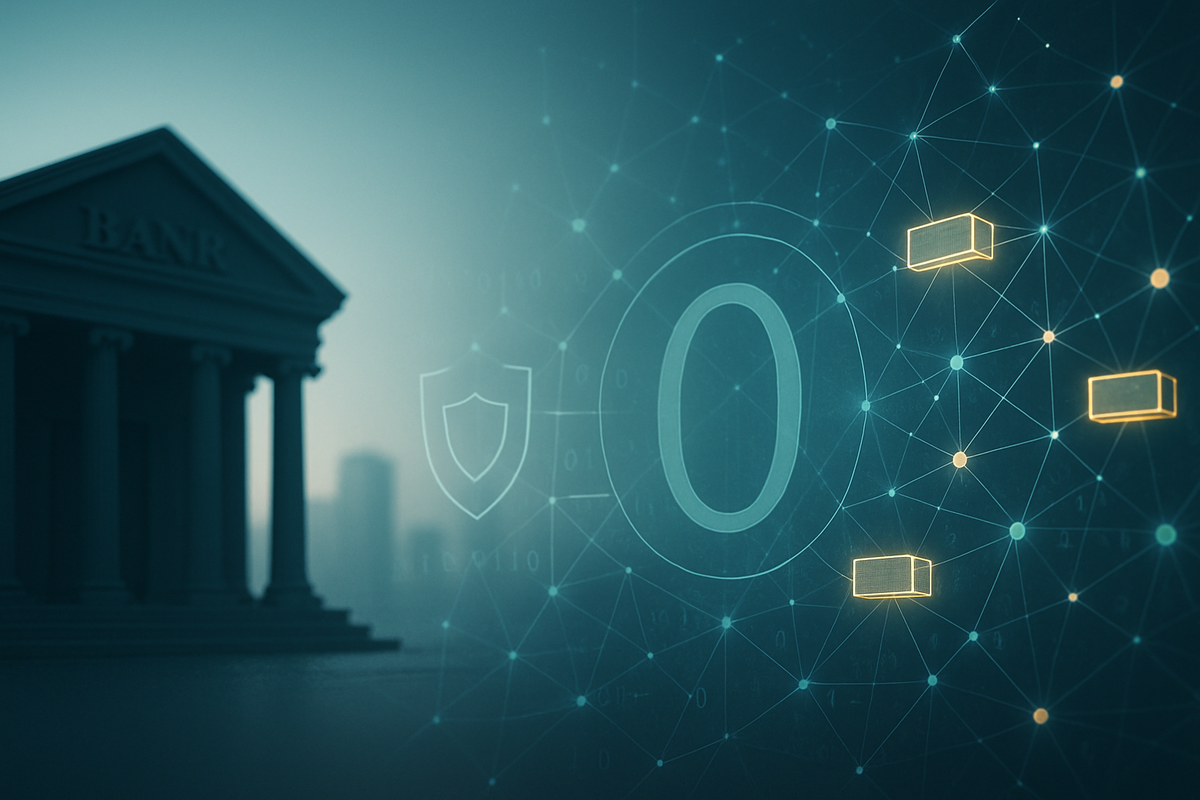The Privacy Imperative: Zero-Knowledge Proofs (ZKPs) Usher in a New Era for Blockchain and Finance

The financial world is on the cusp of a profound transformation, driven by the quiet but powerful emergence of Zero-Knowledge Proofs (ZKPs). This revolutionary cryptographic technique is rapidly redefining the landscape of blockchain security and privacy, addressing critical challenges that have long hampered the widespread adoption of decentralized technologies by institutions and individuals alike. By enabling the verification of information without revealing the underlying data, ZKPs are not merely an incremental improvement but a foundational shift, promising to unlock unprecedented levels of confidentiality and scalability.
This paradigm shift is poised to bridge the chasm between traditional finance and the decentralized web, offering a solution to the "privacy paradox" inherent in public blockchains. Financial institutions, previously hesitant due to the exposure of sensitive data, can now envision a future where compliance requirements like Anti-Money Laundering (AML) and Know Your Customer (KYC) are met without compromising client confidentiality. ZKPs are set to accelerate institutional engagement, foster greater trust, and usher in an era of more efficient, privacy-preserving financial transactions.
The Quiet Revolution: What Happened and Why it Matters
Zero-Knowledge Proofs have transitioned from an academic curiosity to a cornerstone technology, fundamentally reshaping how privacy, scalability, and security are achieved in the blockchain space. At their core, ZKPs allow a "prover" to convince a "verifier" that a statement is true without disclosing any information beyond the validity of the statement itself. This includes properties of completeness (truthful statements are proven), soundness (false statements cannot be proven), and zero-knowledge (no extra information is revealed). This concept, first introduced in 1985 by MIT researchers Shafi Goldwasser, Silvio Micali, and Charles Rackoff, laid the theoretical groundwork, with non-interactive proofs (crucial for asynchronous blockchain environments) emerging by 1991. The advent of blockchain, particularly in the wake of Bitcoin's (BTC) 2009 launch, provided a powerful real-world use case for these once-theoretical tools.
The growing importance of ZKPs stems from their ability to tackle blockchain's most persistent pain points. On one hand, public blockchains, by design, make all transaction details visible, limiting their applicability in sensitive financial or enterprise contexts. ZKPs address this by enabling transactions where sender, receiver, and amount can remain confidential, while the network still verifies legitimacy. On the other hand, traditional blockchains often struggle with scalability, processing a limited number of transactions per second. ZKPs underpin Layer 2 scaling solutions like zk-Rollups, which bundle thousands of off-chain transactions into a single cryptographic proof, significantly boosting throughput and reducing costs on mainnets like Ethereum (ETH).
Key players in this space include pioneering privacy-focused cryptocurrency Zcash (ZEC), which first implemented zk-SNARKs (Zero-Knowledge Succinct Non-Interactive Arguments of Knowledge) for shielded transactions in 2016. Ethereum co-founder Vitalik Buterin has consistently championed ZKPs, particularly zk-Rollups, as the long-term scaling solution for the Ethereum ecosystem. Major blockchain development companies like Polygon (MATIC), with its $1 billion corpus for ZKP adoption and Polygon zkEVM, and StarkWare (STRK), known for its zk-STARKs (Zero-Knowledge Scalable Transparent Arguments of Knowledge) and StarkNet, are leading the charge in building next-generation ZKP infrastructure. Additionally, Matter Labs, developer of zkSync, is a significant contender in the race for scalable, privacy-preserving blockchain solutions.
The initial market reaction to ZKPs evolved from skepticism to enthusiastic adoption. Early implementations by Zcash demonstrated the practical utility of ZKPs for privacy. Subsequently, as blockchain networks faced congestion and high fees, the industry quickly pivoted to recognize ZKPs as a powerful scalability solution. Enterprise interest, especially from financial services, surged as ZKPs offered a pathway to leverage blockchain's benefits while maintaining client and transaction confidentiality. Wall Street firms, including members of the Enterprise Ethereum Alliance like JPMorgan Chase & Co. (NYSE: JPM) and Credit Suisse Group AG (NYSE: CSGN) (before its acquisition), have explored or integrated ZKPs into their distributed ledger technologies. The burgeoning ecosystem, marked by significant funding for ZKP-focused projects, signals strong industry confidence, with the ZK proving market itself emerging as a recognized and rapidly expanding sector.
The Shifting Sands: Winners and Losers in the ZKP Era
The widespread adoption of Zero-Knowledge Proofs is redrawing the competitive lines within the blockchain and traditional finance sectors, creating clear winners and posing significant challenges for those slow to adapt. The ZKP market is projected to reach $10 billion by 2030, with an astronomical demand for nearly 90 billion ZK proofs to power Web3 services, signaling a substantial redistribution of market share and value.
The Winners: Projects and companies embracing ZKPs are poised for substantial gains. Ethereum (ETH), while not directly integrating ZKPs into its core, is a massive indirect beneficiary. ZK-rollup solutions built on Ethereum, such as Polygon zkEVM from Polygon (MATIC), StarkNet from StarkWare, and zkSync Era from Matter Labs, are addressing Ethereum's scalability and cost issues. This will enhance Ethereum's network activity, lower transaction costs, attract more users and developers, and solidify its position as the leading smart contract platform, potentially boosting the long-term utility and value of ETH and related L2 tokens like MATIC and STRK. Companies like Immutable X, an NFT platform, leverage StarkEx and ZK-rollups to offer fast, gas-free transactions for Web3 gaming, gaining a strong competitive edge. Similarly, decentralized exchanges like dYdX (DYDX) and Loopring (LRC) utilize ZK-STARKs and ZK-rollups, respectively, to offer faster, cheaper, and more private trading, enhancing the appeal of DeFi and potentially increasing their trading volumes and token values. Privacy-focused protocols like Mina Protocol (MINA) and Zcash (ZEC), which inherently use ZKPs for their compact blockchain size and shielded transactions, continue to attract users prioritizing confidentiality. Beyond crypto, established tech and financial giants like IBM (NYSE: IBM), Alibaba Group (NYSE: BABA), Tencent Holdings (HKG: 0700), Mastercard (NYSE: MA), and Hitachi (TSE: 6501) are actively exploring or integrating ZKPs for secure identity management, authentication, and regulatory compliance. Their successful integration can bolster product competitiveness, streamline operations, and open new revenue streams, positively impacting their stock performance. Specialized ZKP development firms such as RISC Zero and Succinct are also poised to thrive as critical infrastructure providers.
The Potential Losers: Conversely, entities that fail to adapt to the ZKP paradigm risk losing significant market share. Layer 1 blockchains that do not successfully implement or integrate ZKP-based scaling solutions will struggle to compete with more efficient ecosystems, potentially leading to declining developer and user activity, reduced network fees, and a decrease in their native token's utility and market value. Older privacy coins relying on less efficient or potentially vulnerable cryptographic methods may lose their competitive edge to ZKP-based alternatives offering stronger, verifiable privacy. Centralized Exchanges (CEXs), while they might adopt ZKPs internally for compliance, could see trading volume shift to ZKP-powered decentralized exchanges (DEXs) if users can achieve comparable liquidity with greater privacy and self-custody. This could lead to reduced trading volume, lower revenue from fees, and a need for rapid innovation to maintain relevance, affecting their stock performance. Furthermore, traditional identity verification and data brokerage services face direct disruption. ZKPs empower users with self-sovereign identity, allowing credential verification without revealing personal data, which threatens business models built on collecting and monetizing extensive personal data. Companies that do not adapt to a privacy-centric model or offer ZKP-based identity solutions could see a decline in demand for their services and negative stock performance.
Beyond the Blockchain: Industry Impact and Broader Implications
Zero-Knowledge Proofs are not merely a technical upgrade; they represent a fundamental shift with profound implications for the broader blockchain industry, financial markets, and the very architecture of the digital world. Their unique ability to reconcile transparency with confidentiality addresses a core tension that has long constrained the adoption of decentralized technologies.
This technology fits seamlessly into the burgeoning Web3 movement, which champions user autonomy, decentralization, and enhanced privacy. ZKPs provide the cryptographic bedrock for private transactions, secure identity verification, and compliant operations within decentralized applications (dApps), creating a more trustworthy and user-centric Web3 ecosystem. In Decentralized Finance (DeFi), ZKPs are a game-changer, bridging the gap to institutional adoption. By enabling privacy-preserving compliance, ZKPs allow financial institutions to engage with DeFi protocols without exposing sensitive data, paving the way for confidential real-world asset (RWA) tokenization, private lending, and other institutional-grade activities previously deemed too risky. Projects like StarkEx and Loopring are already leveraging ZKPs to scale DeFi and improve user experience on decentralized exchanges. For enterprise blockchain, ZKPs unlock the technology's full potential. Businesses can now use blockchain for supply chain management, inter-organizational data sharing, and auditing without revealing proprietary information to competitors or partners. JPMorgan Chase & Co.'s (NYSE: JPM) Nexus blockchain, for instance, utilizes ZKPs for tokenized cash settlements and interbank messaging, demonstrating institutional confidence in their privacy-enhancing capabilities.
The ripple effects of widespread ZKP adoption will be significant. Companies that integrate ZKPs effectively will gain a substantial competitive advantage, leading to an industry-wide push for standardization and collaboration. Organizations like the National Institute of Standards and Technology (NIST) are already working to standardize ZKP protocols, which will foster broader implementation and interoperability. Conversely, competitors who fail to adapt to this privacy-first, scalable paradigm risk falling behind in a rapidly evolving market. ZKPs also promise to enhance interoperability by enabling secure and private data exchange between different blockchain networks and traditional systems, fostering a more interconnected digital economy.
From a regulatory standpoint, ZKPs offer a revolutionary solution for achieving AML/KYC compliance with privacy. Financial institutions can prove adherence to regulations without collecting and storing vast amounts of personal data, mitigating data breach risks. However, this also presents a challenge for regulators: balancing the privacy afforded by ZKPs with the need for oversight, particularly in combating financial crimes where transaction data can be concealed. Governments and regulatory bodies, including the White House, are actively evaluating ZKP protocols, and organizations like Coinbase (NASDAQ: COIN) advocate for their incorporation into existing financial regulations to modernize compliance. Historically, ZKPs stand out among privacy-enhancing technologies (PETs) like federated learning, differential privacy, secure multi-party computation (MPC), and homomorphic encryption due to their inherent trustlessness, efficiency for verification, and unique ability to prove a statement's truth without revealing the underlying data. Their development, tracing back to the 1980s, underscores a long-standing academic pursuit now finding its most compelling real-world applications in the blockchain era.
The Horizon: What Comes Next for ZKPs
The journey of Zero-Knowledge Proofs in blockchain is just beginning, with both short-term and long-term possibilities poised to reshape the digital landscape. The immediate future will see ZKPs continue their critical role in resolving blockchain's scalability and privacy dilemmas, while the longer-term outlook points to their integration into a vast array of digital interactions, potentially becoming a foundational layer of the internet itself.
In the short term, ZKPs will cement their position as the go-to solution for blockchain scalability, particularly through ZK-Rollups. These Layer 2 solutions, already being implemented by projects like zkSync and StarkNet, will drastically increase transaction throughput and lower costs on networks like Ethereum (ETH), making DeFi and NFTs more accessible and efficient. Simultaneously, ZKPs will enhance privacy in transactions, allowing users to conduct confidential exchanges on public blockchains, and will revolutionize decentralized identity, enabling users to prove attributes without revealing sensitive personal information. This will be crucial for privacy-preserving compliance and potentially rendering traditional passwords obsolete. For financial institutions, this translates to improved regulatory compliance without data exposure, and for tech companies, it means building more robust and efficient DApps.
Looking long-term, ZKPs are expected to become ubiquitous verification tools across various digital domains, extending far beyond blockchain. They will be instrumental in verifying the authenticity of AI-generated content, securing IoT devices, and even bolstering national security. Advancements in quantum-resistant ZKP cryptography are also in development, future-proofing blockchain systems against emerging threats. Ethereum co-founder Vitalik Buterin has predicted that zk-SNARKs will be as important as blockchains in the next decade, indicating their potential to unlock new forms of secure, private, and scalable digital interactions and fostering greater interoperability between diverse blockchain platforms.
These developments necessitate strategic pivots from both financial institutions and tech companies. Financial institutions must adapt to achieve privacy-preserving compliance, leveraging ZKPs for AML/KYC without compromising client confidentiality. This will be key to building privacy-focused DeFi platforms and leveraging ZK-Rollups for operational efficiencies and cost reduction. Tech companies, on the other hand, must heavily invest in R&D to improve ZKP speed, reduce hardware requirements, and enhance developer tooling, making the technology more accessible. Companies like StarkWare and Matter Labs are already leading this charge, but a focus on user experience and the establishment of industry standards will be crucial for widespread adoption.
The emerging market opportunities are vast, encompassing new privacy-centric DeFi protocols, secure digital identity services, and confidential data marketplaces. ZKPs could revolutionize healthcare data privacy, secure voting systems, and even transform the gaming industry by ensuring fair gameplay and asset ownership. However, significant challenges remain, including the technical complexity and computational intensity of ZKPs, which demand specialized knowledge and resources. The current lack of standardization across different ZKP protocols can hinder interoperability, and the anonymity they provide could invite regulatory scrutiny if clear guidelines are not established. Overcoming these hurdles will require continued technological breakthroughs, collaborative industry efforts, and proactive engagement with regulators.
The Dawn of Verifiable Confidentiality: A Concluding Outlook
The emergence of Zero-Knowledge Proofs represents a pivotal moment in the evolution of blockchain technology and its integration into the global financial system. ZKPs offer a cryptographic solution to the inherent tension between transparency and privacy, addressing fundamental challenges that have historically limited blockchain's mainstream adoption. Their ability to enable verifiable computation without revealing sensitive data is not merely an enhancement but a foundational shift, positioning them as an indispensable technology for the next generation of decentralized systems and Web3.
The key takeaways underscore ZKPs' transformative impact: they provide robust privacy for transactions, dramatically improve blockchain scalability through solutions like zk-Rollups, enhance security by minimizing data exposure, and empower decentralized identity. This paradigm shift in verification is crucial for financial institutions seeking to leverage blockchain while adhering to stringent regulatory demands for confidentiality. The market moving forward is projected for substantial growth, with ZKPs becoming an essential component of Web3 services, enabling high transaction throughput and unlocking new opportunities across various industries.
The lasting impact of ZKPs will be profound. They are poised to become the base layer for a new, privacy-centric internet infrastructure, giving users unprecedented control over their personal data. By enabling regulatory compliance without compromising privacy, ZKPs simplify complex legal frameworks and foster trust in digital interactions. Beyond cryptocurrencies, their applications extend to secure voting, supply chain transparency, confidential data sharing in healthcare, and private computations in finance. As blockchain technology continues to mature, ZKPs will provide a scalable, secure, and privacy-preserving framework, future-proofing decentralized systems against increasing demands and evolving threats, including the advent of quantum computing.
Investors should closely monitor several key indicators in the coming months. Firstly, advancements in ZKP technology and the deployment of more efficient algorithms (zk-SNARKs, zk-STARKs, PLONK, recursive proofs) will be critical for performance and cost-effectiveness. Secondly, observe the growth and adoption of zk-Rollup and zkEVM ecosystems (e.g., zkSync, StarkNet, Polygon zkEVM) as these platforms are vital for scaling major blockchain networks. Increased Total Value Locked (TVL) and user activity on these solutions will signal growing confidence. Thirdly, pay attention to user-friendly implementations and developer tooling that simplify ZKP integration, as accessibility is key to broader adoption. Fourthly, watch for enterprise and institutional adoption, particularly partnerships and pilot programs involving ZKPs in traditional finance, healthcare, and supply chain management. Finally, regulatory developments concerning data privacy and compliance in the context of ZKPs will be crucial, as clear frameworks could accelerate mainstream integration. Significant funding trends in ZKP-focused projects and the emergence of decentralized proving markets will also offer insights into the technology's trajectory. Zero-Knowledge Proofs are not just a technological trend; they are a critical enabling technology underpinning the next phase of blockchain and Web3 development, promising long-term impact across industries and offering significant potential for those who recognize their profound implications.



